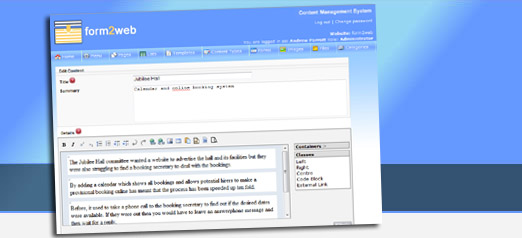There are many benefits to having a CMS or content News system and in fact for all but the simplest of websites, it makes sense to switch to one, or a similar database-driven solution. Soon the only commercial sites left using simple HTML websites will be small local businesses that simply need their contact details online that are hardly ever altered.
Below we list a few of the most powerful arguments for having a content management system.
Fast page edits
A content management system allows anyone (with appropriate permissions) to edit pages using an ordinary web browser. Changes can be published immediately so simple text changes take a matter of minutes. Compare this to a standard website without a CMS where the changes have to be made by a developer or someone with some technical knowledge of HTML (the language used to build websites). There is often a cost but more importantly a delay while someone communicates the changes to the developer and then waits for them to fit the work in around other commitments. With a CMS, the change can be made instantly.
User Permissions
Users can be assigned roles and permissions that prevent them from editing content which they are not authorized to change. In addition a user can have permissions on specific pages. For example one role might be a contributor where they can add content to the website but not publish it until approved by an editor.
Design Consistency
Often the content is stored in a database and displayed via a template meaning that the content from all authors is presented with the same, consistent design.
Content Scheduling
Publication of pages and articles can often be date-controlled, hidden for publishing later or password protecting so that users need to log in to view it.
Search Engine Optimisation
With a content managed website it is much simpler to edit the titles and descriptions associated with a page or to edit the content to include a few more keywords. So you can tweak these settings constantly to achieve the best rankings in the search engines.
Routine website changes
Above all, a CMS makes website changes a routine, easy process that enables the site to be updated frequently and be kept looking fresh. It is a painless process that is in direct contrast to the old web page system, where changes were tricky, costly, or involved delay - so they were only ever made reluctantly. Change is so easy on a CMS that it becomes a new marketing tool, used as a matter of course instead of being a painful and costly exercise. Most websites will be able to take advantage of this functionality. As it is so easy to change a price, a phone number, a date, or a detail anywhere, it becomes a routine matter to update the site. A CMS is a dynamic site, instead of being a static, fixed affair like an HTML site.
Dynamic Content
A CMS can automatically generate new pages based on any content that is added. For example after adding a news article, the news summary page is automatically updated to show the new listing and a new page is generated to display the article. With a standard HTML site you would have to add the article to both the listing and also create a new page (and update any navigation) to display it. Similarly with deleting items, in the CMS it is automatically removed from any pages but in an HTML site you would have to manually delete from all the page it appears on and update any navigational links.
Searchable content
As all the content is stored in a database it is very easy to implement a site search facility.
Easily extended
Most content management systems have a plugin architecture so that it is easy to add additional features or modules. It is also possible to integrate the CMS with other business systems in your organisation.
These are only a handful of reasons for having a content managed website. See the features and case study pages on this site for more examples. Or contact us for further information.
Bookings for the Jubilee Hall have increased by a huge amount since the website was launched.
One of our clients said it was the best booking system they'd seen.
Roger Stokes

